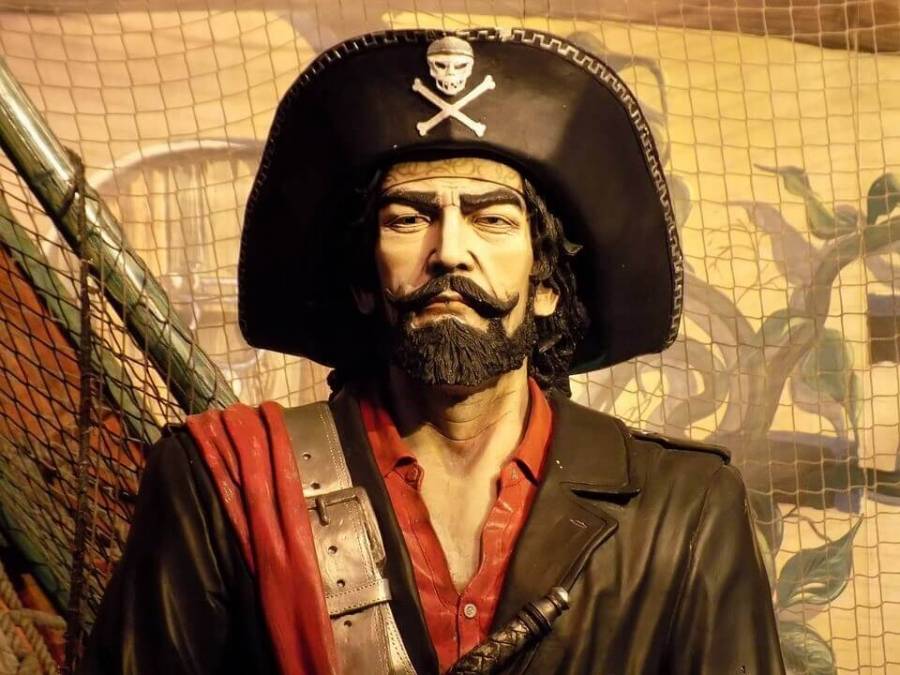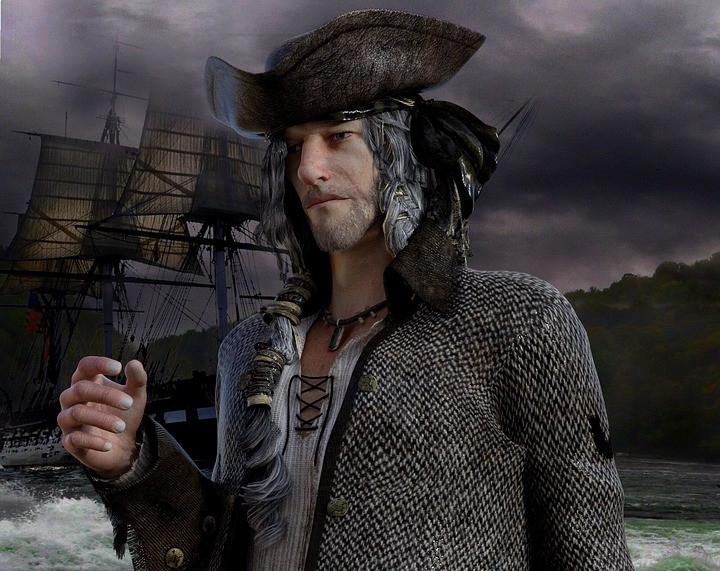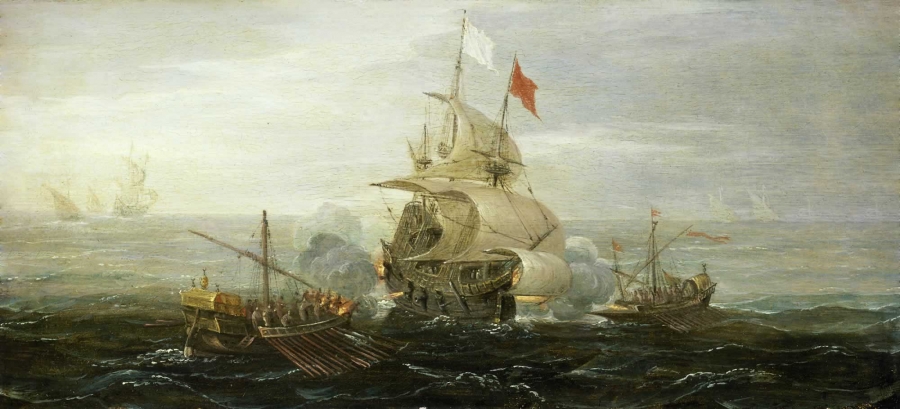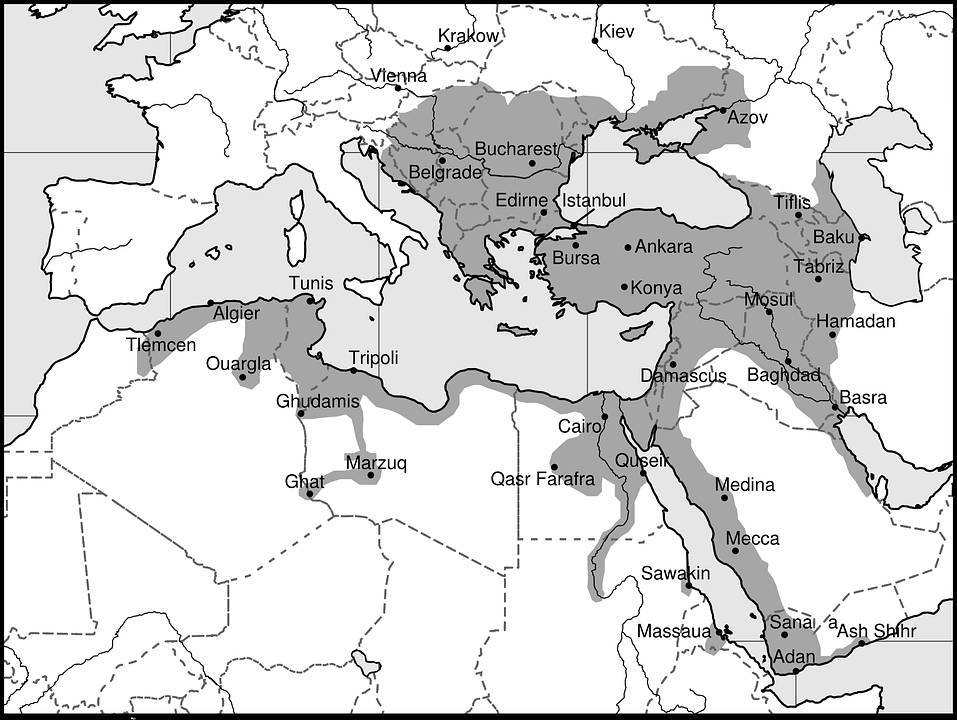What is the similarity between a privateer (wreaking havoc on the nation’s enemies) backed by the crown of England & a pirate hunted by the same crown & a saviour of innocent people fleeing religious persecution from a land, where change in power structure of the land had brought sudden & unexpected calamity on the normal population? Well, common sense would not find many similarities between the different categories of people described above, but in this particular case, they were all the different persona of the same man – Captain Jack, in different stages of his life.
The small town of Faversham in Kent, southeast England is hardly a place where a story of an Ottoman loyalist of 16th century would be expected to begin, but it was here in 1553 that John Ward, also known as - Jack Ward was born. A small town frequented by illicit liquid dealers, pirates & other people of questionable character, of the period, it was not exactly the best place for a young boy to grow up. However, Jack Ward, who later become famous as Jack Birdy, grew up to be an honest man. At least that was the way he started his life initially.

Jack Ward spent his youth and early adulthood working in the fisheries sector. But the small town of Faversham was not sufficient to cater to the needs of Jack Ward, who was growing impatient with his life in the small town. Ambitions of the young boy were much larger than the avenues, that the small town could provide; but these were changing times.
In 1588, King Phillip II of Spain decided to send a fleet of ships to invade England, which would later become famously known as the Spanish Armada. Although the Spanish invasion would fail, it did set up a chain of counter-reactions from the English side.
Private individuals were enlisted by the English crown, to sail in privately owned armed ships, and attack the ships of the rival country (Spain in this case) to rob and terrify them. Privateers were granted a license by Queen Elizabeth I to plunder ships belonging to the Spanish. In turn, they were allowed to keep a big percentage of the profits, while giving the rest to the government. Jack Ward, would soon find himself becoming a privateer, serving the English crown.
With blessings from Queen Elizabeth I of England, John Ward was plundering Spanish ships, and splitting his profits with the government. The license given by the government – also known as letters of marquee, ensured that Jack Ward was not yet treated as a pirate, even while acting like one. However, all good things come to an end & when James I came to power, he decided to end the war with Spain in 1604. Suddenly being a privateer was no longer a legal career option.
Soon after in 1604, Jack Ward was forcefully recruited into naval services of the English king. However, a free-spirited person like Jack could hardly be controlled against his will, by any royal diktat. Reportedly it was the hard and miserable living conditions in the ship, under the government, which led to severe disillusionment of Jack & his co sailors.
Jack Ward and his band of not so merry men stole a small sailing vessel from Portsmouth Harbour that belonged to a Catholic merchant and & set sail for the English Channel. Jack was quite popular among the men and he was soon elected their captain & thus started the life of Captain Jack Ward, a name that would be soon known across many nations.

As he sailed the high seas, the number of people as well as ships under Captain Jack Ward, began to increase not just in quantity but also in sophistication. He took many other ships; sometimes by force and sometimes by treachery. The sailors under him were no longer just English but included men from other European countries as well. Jack Ward’s name began to strike fear on all those who sailed the seas and he became the uncrowned king of the Mediterranean Sea.
Even the most successful of pirates need a harbor to dock his ships and Jack Ward was no different. However, who would support a pirate, who was pillaging unsuspecting European ships. Certainly, no European power would allow that. At this critical juncture, the local ruler of Tunis & representative of the Ottoman empire – Uthman Dey, came to Captain Jack’s rescue.
It was in August of 1606 that Jack Ward/John Ward came to an understanding with Uthman Dey that he could use Tunis, as his base of operations. Of course, this came at a price. The local ruler of the Ottoman empire would get 10% of the total of the loot earned by the pirate. It was a mutually beneficial relationship, that profited both of the sides.
As exploits of Jack Ward increased, his tales also began to spread around and he started to take a legendary image. He also got another name. Jack ward was also known to be very fond of birds, so he would later also get the name of Captain Jack Birdy among his friends.
Captain Jack Birdy’s success and his growth in stature, both in terms of the number of ships and men made him more daredevil, with each passing day. So, it was on the fateful day of 26 April 1607 AD, that Captain Jack encountered a large merchant ship, from Venice, in the sea between Cyprus and Turkey. Attacking the ship named Reniera e Soderina, would soon change the course of Captain Jack Birdy’s life.
Although Reniera e Soderina was a huge ship of 1500 tons, attacking it with 2 much smaller ships (Rubi – 400 tons & Gift -200 tons) at the disposal of Captain Jack Birdy, speaks a lot about his audacity. Finally, after a good fight, the captain and crew of Reniera e Soderina were forced to surrender. The cargo of the ship was indeed valuable containing silks, indigo, cotton & other valuable merchandise (estimated between 500 thousand pounds to 2 million pounds) and had certainly been worth taking the risk.

However, this incident took Captain Jack’s notoriety to its peak, as Venice was very close to declaring war on England, because of Captain Jack’s misadventure. Jack was an English citizen and the English government had to take responsibility for the pirate’s action. The English government on its part assured the Venetians, that all possible actions would be taken against Captain John/Jack Ward if he could be apprehended.
Captain Jack Birdy was initially quite overjoyed by his victory and modified Reniera e Soderina to a formidable dangerous ship, that could face even the mightiest ships on the sea, but he had bitten off more than what he could chew. The remodeling had made Reniera e Soderina structurally weak from within the ship, and it broke up in a storm and sunk in her maiden voyage. 350 pirates lost their life & Captain Jack, who had managed to escape in a smaller vessel, found himself become an object of hatred in Tunis from all those people who had lost friends/relatives in the accident.
His position had weakened in Tunis and he was getting more reliant on Uthman Dey for protection. Maybe it was also the love for his home or for his wife, whom he had left behind in England, that Captain Jack Birdy would later ask King James I of England for a royal pardon, so he could return home. However, for the English government, he was far beyond redemption. His request was denied by the royal crown.
This was a severe setback for Captain Jack Birdy. Realizing that he would never return to England, he understood that he was condemned to spend the rest of his life in Tunis. He decided to make the best of the worst situation and took some radically difficult decisions.
In September 1610 AD, Captain Jack Birdy converted to Islam along with his entire crew & declared loyalty to the Ottoman empire. He was totally disillusioned with the constant fights between Catholic & Protestants, and the behavior of the English crown & the Papal authorities. As a Muslim, he took a new name of Yusuf Reis & was received with open arms by Uthman Dey, the ruler of Tunis. By the end of 1610, the Christian European countries also received the news about Captain Jack’s religious conversion.
Strangely after Captain Jack Birdy changed his name to Captain Yusuf Reis, he changed his lifestyle to that of devout Muslim. He married an Italian woman (Jasmine/Jessimina the Sicilian - who also changed her religion to Islam) and totally gave up drinking alcohol (reportedly he had been a heavy drinker previously) & dressed like the locals, which included a turban wrapped around his head and the coat of a Turk.
He started dressing like the Ottomans & prayed like any other religious Muslim would do. However, he didn’t forget his English wife & continued to send money to her. Yusuf Reis was very powerful by now and a trusted ally of the Ottomans.

16th and 17th centuries were disturbing times in Europe. The Spanish monarchy was Christians and they were clearly not very supportive of the vast population of Muslims and Jews in the land. Many Muslims were forcefully converted to Christianity as were the Jewish population. These people & their descendants were known respectively as Moriscos & Conversos.
In spite of their conversion to Christianity, the crown of Spain looked upon the Moriscos and Conversos with distrust (the Moriscos more so) and most of them were officially ordered to leave Spain or were persecuted.
It was at this time of crisis, that Captain Yusuf Reis emerged as a savior of these hapless people fleeing from persecution from their own land. He rescued thousands of Spanish Moriscos & Conversos, fleeing expulsion from the governmental authorities, and they were given a safe haven in Tunis. For his actions, he gained the respect of not just those escaping persecution, but also of many Ottoman loyalists and other Muslims living around northern Africa.
As his stature and popularity increased in the Islamic world, the same plummeted in the Christian European countries. The fact that an English sailor previously employed by the English crown had turned into a Barbary pirate/Barbary corsair (pirates who were Ottoman loyalists & based in northern Africa) was nothing less than a total betrayal of the country & the crown. The stories in Tunis & northern Africa portrayed Yusuf Reis as a legendary hero. However, in Christian Europe, John Ward/Jack Ward/ Jack Birdy was a European outcast & no less than the devil incarnate.
By the end of his career, Captain Jack became the most feared pirate in the Mediterranean Sea. Acting like an Admiral, he commanded a fleet of his pirate ships. By the year 1610 AD, his fleet consisted of 15 ships and 1500 men. He profited greatly from his piracy so that he could retire comfortably, which he did in 1612 AD.

Towards the end of his life, Yusus Reis lived as a nobleman in Tunis, very different from the life of the most feared Barbary Corsair in the world, that he led earlier. Now a lord in Tunis, he lived in a grand palace, adorned with marble and alabaster, that would even turn many kings and lords of Christian Europe, green with envy.
Wealthy beyond any person’s wild imagination, he spent most of his time teaching young Ottoman loyalist pirates the art of navigating ships & how to use heavy guns attached to them. In his spare time, he grew little birds and also held grand feasts for his guests, which sometimes even included curious Christian Europeans who met him occasionally.
Yusuf Reis died at the age of 70 years in the year 1622 AD, possibly due to the plague. However, the stories of his life continued to echo through time via different sources, which provided vital insights into his life. Most of the details about his life came from multiple ballads, pamphlets, plays, and booklets written about him by his contemporaries.
Perhaps most popular among these were the play of 1612 AD called – “ A Christian Turn’d Turk” by Robert Daborne and excerpts from the journal – “ The Total Discourse of the Rare Adventures and Painful Peregrinations of long Nineteen Years Travels from Scotland” written by William Lithgow, a Scotsman who met Yusuf Reis in Tunis as his guest (a meeting - which took place in September 1615 ) and chronicled his meeting with the legendary pirate in detail.
A few years back many Turkish media outlets came up with the hypothesis that the historical John Ward/Jack Ward/Captain Jack Birdy was the inspiration behind the fictional Captain Jack Sparrow from the movie series – Pirates of the Caribbean. Although Captain Jack Birdy was also called Captain Jack “Asfur” by the locals (Asfur being Arabic for “Sparrow”), it is a bit hard to say if indeed the character of Jack Sparrow was inspired by Jack Asfur. A heavily drunk pirate, with conscience & some resemblance in the name; certainly, gives rise to a valid argument, that Captain Jack Birdy may have been indeed the historical figure behind the fictional character.

The life of the English pirate – John Ward/Jack Ward/Captain Jack Birdy or the Ottoman Corsair – Yusuf Reis is a legendary story, that somehow faded into pages of history. Hated in his time by countries of Christian Europe, a hero for many oppressed people whom he helped fleeing religious persecution – the real Captain Jack remained a forgotten story, till a Hollywood blockbuster made people rise up and turn pages of history. Maybe history does repeat itself, in some form or the other.